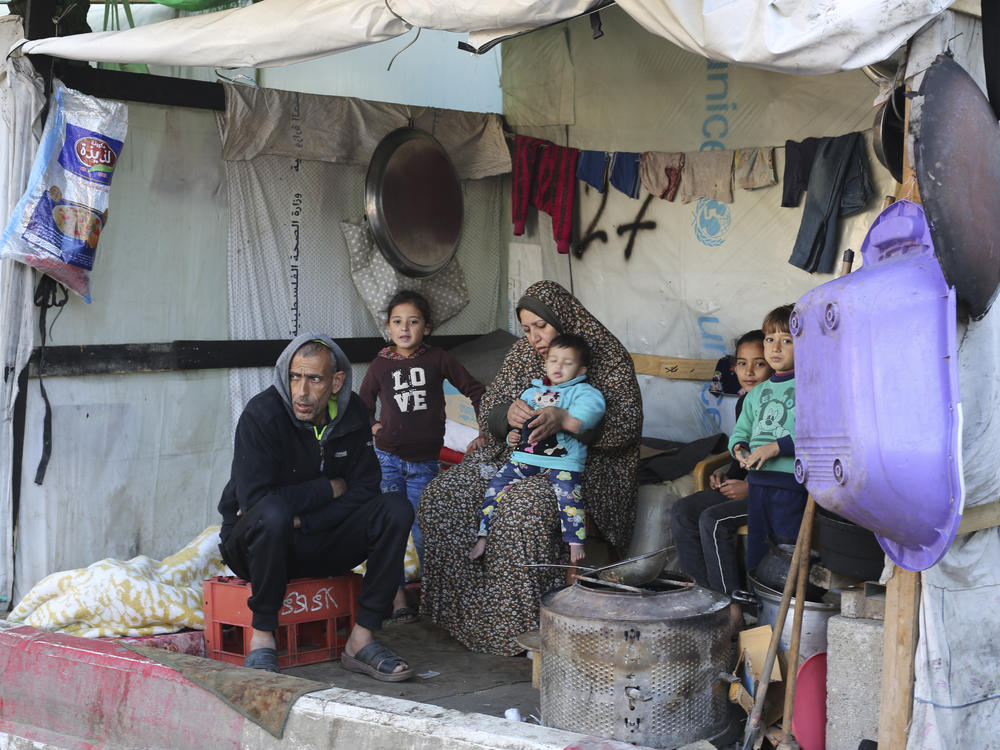Section Branding
Header Content
Hezbollah fires rockets at northern Israel in response to killing of a Hamas leader
Primary Content
BEIRUT — Lebanon's Hezbollah militia fired dozens of rockets at northern Israel on Saturday, warning that the barrage was its initial response to the targeted killing, presumably by Israel, of a top leader from the allied Hamas group in Lebanon's capital earlier this week.
The rocket attack came a day after Hezbollah leader Sayyed Hassan Nasrallah said that his group must retaliate for the killing of Saleh Arouri, the deputy political leader of Hamas in a Hezbollah stronghold south of Beirut. Nasrallah said that if Hezbollah did not strike back, all of Lebanon would be vulnerable to Israeli attack. He appeared to be making his case for a response to the Lebanese public, even at the risk of escalating the fighting between Hezbollah and Israel as the war between Israel and Hamas rages on.
Hezbollah said Saturday that it launched 62 rockets toward an Israeli air surveillance base on Mount Meron and that it scored direct hits. The group said rockets also struck two army posts near the border. The Israeli military said about 40 rockets were fired toward Meron and that a base was targeted, but made no mention of the base being hit. It said it struck the Hezbollah cell that fired the rockets.
The cross-border escalation came as U.S. Secretary of State Antony Blinken was kicking off an urgent Middle East diplomatic tour, his fourth to the region since the Israel-Hamas war erupted three months ago. The war was triggered by a deadly Hamas attack on southern Israel in which militants killed about 1,200 people, mostly civilians, and took some 250 hostages.
In recent weeks, Israel has been scaling back its military assault in the north of the territory and pressing its heavy offensive in the south, vowing to crush Hamas. In the south, most of Gaza's 2.3 million Palestinians are being squeezed into smaller areas in a humanitarian disaster, while still being pounded by Israeli airstrikes.
On Saturday, the Health Ministry in Hamas-run Gaza said 122 Palestinians were killed over the past 24 hours, bringing the total since the start of the war to 22,722. The count does not differentiate between combatants and civilians. The ministry has said two-thirds of those killed have been women and children. The overall number of wounded rose to 58,166, the ministry said.
In the southern city of Khan Younis, the focus of Israel's ground offensive, the local European Hospital received the bodies of 18 people killed in an overnight airstrike on a house in the city's Maan neighborhood, said Saleh al-Hamms, head of the nursing department at the hospital. Citing witnesses, he said more than three dozen people had been sheltering in the house, including those displaced, when it was hit.
Israel has held Hamas responsible for civilian casualties, saying the group has embedded within in Gaza's civilian infrastructure. Still, international criticism of Israel's conduct in the war has grown more persistent because of the rising civilian death toll in Gaza. The United States has urged Israel to do more to prevent harm to civilians, even as it keeps sending weapons and munitions, while shielding its close ally against international censure.
U.S. envoy Blinken meets with Turkish leader
Blinken began his latest Mideast trip in Turkey on Saturday. The Biden administration believes that Turkey and others can exert influence, particularly on Iran and its proxies, to tamp down fears of a regional conflagration. Those fears have spiked in recent days with incidents in the Red Sea, Lebanon, Iraq and Iran.
In talks with Turkish President Recep Tayyip Erdogan and Foreign Minister Hakan Fidan, Blinken will also be seeking Turkish support for still nascent plans for post-war Gaza that could include monetary or in-kind contributions to reconstruction efforts and some form of participation in a proposed multinational force that could operate in or adjacent to the territory.
From Turkey, Blinken will travel to Turkish rival and fellow NATO ally Greece to meet Prime Minister Kyriakos Mitsotakis at his residence on the Mediterranean island of Crete. Mitsotakis and his government have been supportive of U.S. efforts to prevent the Israel-Hamas war from spreading and have signaled their willingness to assist should the situation deteriorate.
Other stops on the trip include Jordan, followed by Qatar, the United Arab Emirates and Saudi Arabia on Sunday and Monday. Blinken will visit Israel and the West Bank next week before wrapping up the trip in Egypt.
Copyright 2024 NPR. To see more, visit https://www.npr.org.

